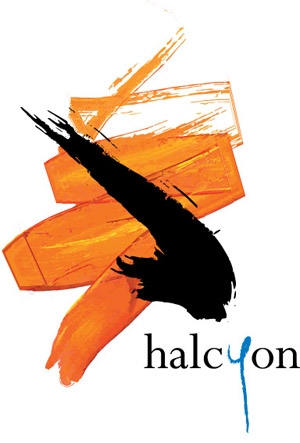“Review by Alex Rainieri, Music Trust’s e-zine. Loudmouth, May 2019
From the Hungry Waiting Country
Artist: Halcyon
Category: Classical, New Music, Vocal
Label: Tall Poppies – TP258
From the hungry waiting country is a 2018 release on the Tall Poppies label featuring masterful performances by Halcyon of three vocal chamber works by one of Australia’s most well-respected composers, Elliott Gyger.
Gyger has contributed a considerable body of work to the canon of vocal music which includes the recent critically acclaimed chamber opera on David Malouf’s novel Fly Away Peter. His newest opera Oscar and Lucinda premieres in 2020, a co-production and co-commission of Sydney Chamber Opera, Opera Queensland and Victorian Opera.
Gyger’s writing is florid, beautifully lyrical and imbued with a sense of long descriptive musical lines, even when they exist within fractured and complex textures.
This album opens with giving voice (2012), the only work of the three featured on this disc that I struggled a little to connect with. Various authors of texts on the theme of early childhood are featured, but I found myself hoping for less of a macabre approach to such immediately powerful subject matter.
The work is impressively crafted and the performance demands an equal level of respect. A particularly interesting facet of the composition is its use of silence and the juxtaposition of active and passive textures as a device for employing both drama and repose.
Petit Testament (2008) for soprano, mezzo-soprano and piano is the briefest work on this album and perhaps the most immediately lyrical. Australian poets James McAuley and Harold Stewart’s collaborative writings under the fictional pen-name of ‘Ern Malley’ are the source of the text for Petit Testament.
On reading the poem, there is a strong sense of abstraction and of mirage. The protagonist journeys peripatetically and is seemingly suspended from time and reality with an all-encompassing vision of past-present-future.
Gyger’s use of two female voices to represent the dual authorial presence inherent in the text is powerfully portrayed by Alison Morgan and Jenny Duck-Chong. The paradox of duality within the discourse of a singular character allows the music to texturally butterfly between unified lines and subtle heterophony, projecting a dialogue of both an internal and external experience.
This work has a charming sense of lilt with a lyrically infused sense of ‘song’ as we traditionally understand it. In the same way that the two voices interact and intertwine, the role of the piano in this work (impressively rendered by Sally Whitwell) weaves in and out of prominence, sometimes playing a purely accompanimental role and at other times propelling the music in new directions. As the poem transcends the physical plane in its final verse, the music too wafts into in the infinite with a final subtle flourish on the words “I have split the infinite. Beyond is anything”.
The final work on this album From the hungry waiting country (2006) is scored for four female voices (Alison Morgan, Belinda Montgomery, Jo Burton and Jenny Duck-Chong) and harp (Genevieve Lang), conducted on this recording by Matthew Coorey. Extracts of fifteen different texts feature and are interwoven throughout, overlaid in intricate patterns over the course of this monumental half-hour work.
Eight ancient religious texts in a variety of languages are set alongside seven poems in English by Australian authors. The linking threads within the disparate components of the libretto are a commentary on ethics and nature, with a specific focus on environmental occurrences and the Australian landscape. As such, the image of water in the desert is often used as a metaphor for divine grace.
There are two sections in From the hungry waiting country. The composer says of the work that “Both parts start in more or less the same place – waiting for rain – but in Part I (Wet) the prayer is answered, whereas in Part II (Dry) it is not”.
The chorus of four voices often move in close pitch proximity, creating a densely weaving halo of counterpoint. The voices seem to mostly operate as a unit throughout the work. I was curious as to whether there might be moments where voices breakaway and gain a sense of independence, but greater emphasis is invested into the textural tapestry of the work and the fascinating dimensions of how the multiple texts interact with one another.
In overlaying texts, there is an inevitability in losing the coherence of narrative. Certain words and phrases certainly do pop out of the texture but the details of the texts are somewhat submerged within the overall texture. This is not a negative comment. Gyger draws the listener as much to the spoken word as he does to the purely musical discourse of the work, allowing music and text to co-exist without hierarchy.
A totally bizarre incantational, quasi-barbershop ending took me totally by surprise. The music morphs into a ghostly sine-tone game of musical snakes and ladders, making me imagine a sonic snake-charmer reminiscent of the vocal writing in Morton Feldman’s Three Voices and certain choral works by Thomas Tallis. From the hungry waiting country pulled me deeper into its universe as it reached its apex, leaving me hoping and wanting for more, much more!
This work is a unique and important contribution to the canon of Australian chamber music. It is my hope that performers, audiences and presenters alike invest energies into ensuring that this piece sees a life far into the future.
My experience with this album was highly rewarding and engaging. I would encourage even those disinclined to engage with unfamiliar contemporary work to challenge yourselves with this strikingly lush collection of vocal chamber works by Elliott Gyger, performed masterfully by Halcyon.
Alex Rainieri
This review appeared in Music Trust’s e-zine Loudmouth

